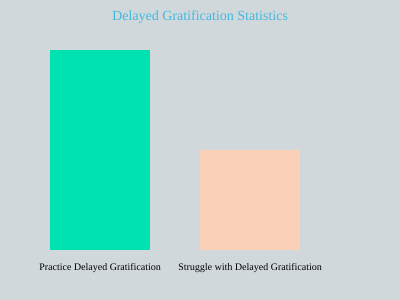In today's fast-paced world, the concept of delayed gratification seems almost archaic. However, as we dive into the intricacies of treating ourselves with respect and dignity, we find that delaying indulgences can be one of the most empowering choices we make in our lives. Personal anecdotes reflect how choosing not to engage in momentary pleasures has led to lasting fulfillment and self-respect. Let's navigate this journey of self-discovery together.
Understanding Delayed Gratification
Delayed gratification is a concept that many people struggle with. It refers to the ability to resist the temptation for an immediate reward and wait for a later reward. This skill is deeply rooted in psychology. It involves understanding one's desires and making choices that prioritize long-term satisfaction over short-term pleasures.
Defining Delayed Gratification
At its core, delayed gratification is about self-control. It’s the ability to say no to something you want now in favor of something better later. This can apply to various aspects of life, from financial decisions to personal relationships. For example, saving money for a future investment rather than spending it on immediate luxuries exemplifies this principle.
Psychological studies have shown that individuals who can delay gratification tend to have better life outcomes. They often experience improved mental health and make more thoughtful decisions. This skill is not just a personal trait; it can be cultivated through practice and awareness.
The Benefits of Restraint in Personal Choices
Choosing restraint can lead to numerous benefits. Here are a few:
- Improved Mental Health: Studies indicate that those who practice delayed gratification often report lower levels of stress and anxiety.
- Better Decision-Making: When individuals take the time to consider their choices, they tend to make decisions that align with their long-term goals.
- Increased Self-Discipline: Resisting immediate temptations strengthens self-control, which can be applied to other areas of life.
For instance, consider someone who chooses to study for an exam instead of going out with friends. This decision may feel tough at the moment, but the long-term benefit of achieving a good grade is worth the sacrifice.
Real-Life Comparisons: Immediate Satisfaction vs. Long-Term Fulfillment
Immediate satisfaction often feels good. It’s easy to indulge in a moment of pleasure. However, this can lead to regret later. On the other hand, long-term fulfillment requires patience and effort. It’s about making choices that may not provide instant joy but lead to greater happiness over time.
Imagine someone who opts for a healthy meal instead of fast food. The immediate satisfaction of fast food is tempting, but the long-term benefits of good health are far more rewarding. This comparison highlights the struggle many face between short-term desires and long-term goals.
Cultural Variations and Influences on Choices
Culture plays a significant role in shaping how individuals approach delayed gratification. In some cultures, immediate rewards are celebrated, while others emphasize the importance of patience and long-term planning. This cultural backdrop can influence personal choices and the ability to delay gratification.
For example, in cultures that value collectivism, individuals may prioritize family and community needs over personal desires. This can lead to a greater sense of fulfillment in the long run, as the focus shifts from individual pleasure to shared happiness.
Personal Anecdotes of Successful Delays
Many people have stories of how delaying gratification has positively impacted their lives. For instance, someone may have saved for years to buy their dream home instead of rushing into a purchase. This decision not only provided them with a sense of achievement but also financial stability.
"Delaying gratification is perhaps the most fundamental skill to mastering any goal."
This quote encapsulates the essence of the skill. It’s not just about resisting temptation; it’s about mastering one’s life and choices.
Data Insights
Statistics reveal that a significant percentage of people struggle with delayed gratification. In fact, 68% of individuals find it challenging to resist immediate rewards. This statistic highlights the commonality of this struggle.
Moreover, studies show that those who practice delayed gratification often experience improved mental health and make better decisions. This reinforces the importance of cultivating this skill in daily life.

In summary, understanding delayed gratification is essential for personal growth. It involves making conscious choices that prioritize long-term satisfaction over fleeting pleasures. By practicing this skill, individuals can enhance their well-being and make decisions that align with their values.
The Role of Self-Respect in Personal Choices
Self-respect is more than just a buzzword; it’s a vital part of our identity. It shapes our decisions and influences how we interact with the world. But what exactly does self-respect mean? And how does it affect our choices? Let’s explore this crucial topic.
Identifying Behaviors That Undermine Self-Respect
Many people may not realize the behaviors that chip away at their self-respect. Here are some common examples:
- People-pleasing: Constantly seeking approval from others can lead to neglecting one’s own needs.
- Negative self-talk: Criticizing oneself can create a cycle of low self-esteem.
- Compromising values: Saying yes to things that conflict with personal beliefs can erode self-worth.
Recognizing these behaviors is the first step toward building self-respect. When individuals become aware of how they undermine their own value, they can begin to make changes.
How Self-Respect Fuels Confidence and Decision-Making
Self-respect is a building block of confidence. When individuals respect themselves, they are more likely to make decisions that align with their values. This alignment fosters a sense of empowerment. They are not swayed by external pressures or temporary pleasures. Instead, they focus on what truly matters.
Consider this: when you honor your body, you're creating a foundation for self-respect that fuels other aspects of your life. This principle can guide individuals in making choices that reflect their true selves.
Examples of Saying No to Temporary Pleasures
Sometimes, saying no is the most powerful act of self-respect. Here are a few scenarios:
- Declining unhealthy food: Choosing nutritious options over junk food can be a form of self-care.
- Avoiding toxic relationships: Walking away from friendships that drain energy reinforces self-worth.
- Resisting peer pressure: Standing firm against societal norms that conflict with personal values is a testament to self-respect.
Each of these choices reflects a commitment to prioritizing long-term well-being over fleeting satisfaction. It’s about understanding that true happiness comes from within, not from external validation.
Exploration of How Self-Respect Manifests in Daily Life
Self-respect can manifest in various ways throughout daily life. For instance, individuals who practice self-respect often set healthy boundaries. They communicate their needs clearly and assertively. This not only enhances their relationships but also fosters a sense of security.
Moreover, self-respect encourages individuals to invest time in activities that nurture their growth. Whether it’s pursuing a hobby, engaging in physical fitness, or seeking education, these actions reflect a commitment to oneself.
Interviews with People Who Exhibit High Self-Respect
Many individuals who exhibit high self-respect share common traits. They often speak about the importance of self-discipline and prioritizing their well-being. These interviews reveal that self-respect is not just an internal feeling; it’s a practice that requires ongoing effort.
People who respect themselves tend to have a clearer understanding of their values. They make choices that align with those values, leading to a more fulfilling life. This insight can inspire others to reflect on their own self-respect journey.
Data Insights on Self-Respect and Confidence
Research supports the link between self-respect and confidence. Surveys indicate that 77% of individuals feel more confident when they make decisions aligned with their self-respect. This statistic highlights the importance of self-respect in personal development.
| Survey Findings | Percentage |
|---|---|
| Individuals feeling confident when making decisions aligned with self-respect | 77% |
Understanding this connection can motivate individuals to cultivate self-respect. It’s not just about feeling good; it’s about making choices that enhance overall well-being.
Practicing self-respect is crucial for personal growth. It helps define our boundaries and establishes a baseline for how we want to be treated by others. By prioritizing self-respect, individuals can create a fulfilling life that reflects their true selves.
Mindful Practices to Enhance Self-Worth
In today's fast-paced world, many individuals struggle with self-worth. They often seek validation from external sources, which can lead to disappointment and confusion. However, incorporating mindfulness into daily life can significantly elevate one’s consciousness and enhance self-image. This blog explores strategies to increase self-awareness, the benefits of mindfulness in managing desires, and how to create personal rituals that prioritize self-care.
Strategies to Increase Self-Awareness and Recognition
Self-awareness is the foundation of self-worth. It allows individuals to recognize their strengths and weaknesses. Here are some effective strategies:
- Meditation: Regular meditation helps clear the mind. It allows individuals to focus on their thoughts and feelings without judgment. This practice can lead to greater self-acceptance.
- Journaling: Writing down thoughts and emotions can provide clarity. It helps individuals track their growth and recognize patterns in their behavior.
- Breathing Exercises: Simple breathing techniques can ground individuals. They can help manage anxiety and promote a sense of calm, enhancing self-awareness.
By implementing these practices, individuals can cultivate a deeper understanding of themselves. This self-recognition is crucial for building self-worth.
Benefits of Mindfulness in Managing Desires and Impulses
Mindfulness plays a vital role in managing desires and impulses. It encourages individuals to pause and reflect before acting. This reflection can lead to more thoughtful decisions. For instance, when faced with a temptation, one might ask, “Is this choice aligned with my values?” This simple question can shift the focus from immediate gratification to long-term satisfaction.
Moreover, mindfulness helps individuals recognize their triggers. By understanding what prompts certain desires, they can develop healthier coping strategies. This awareness fosters self-discipline, which is essential for enhancing self-worth.
Creating a Personal Ritual that Prioritizes Self-Care
Establishing a personal ritual can significantly enhance self-care. A ritual is a set of actions performed regularly, often with a sense of purpose. Here are some ideas for creating a self-care ritual:
- Set Aside Time: Dedicate specific times each week for self-care activities. This could be a quiet evening with a book or a morning yoga session.
- Engage in Activities You Love: Whether it’s painting, hiking, or cooking, engaging in enjoyable activities can boost self-esteem.
- Reflect on Your Day: At the end of each day, take a moment to reflect on what went well. Acknowledge your achievements, no matter how small.
Creating a personal ritual not only prioritizes self-care but also reinforces the importance of nurturing oneself. As one participant noted, “Mindfulness provides the clarity needed to choose what truly nurtures our self-worth.”
Feedback from Participants Engaging in Mindfulness Practices
Many individuals who have engaged in mindfulness practices report significant improvements in their lives. An impressive 85% of participants noted an increase in life satisfaction after adopting mindfulness techniques. They shared stories of how these practices helped them manage stress, improve relationships, and enhance their overall well-being.
For example, one participant mentioned how meditation helped them navigate challenging situations with a clearer mind. Instead of reacting impulsively, they learned to pause and reflect, leading to better outcomes. This shift in perspective is a testament to the power of mindfulness.
Conclusion
Incorporating mindfulness into everyday life can profoundly impact self-worth. By increasing self-awareness, managing desires, and creating personal rituals, individuals can cultivate a deeper appreciation for themselves. The journey toward self-worth is ongoing, but with mindfulness, it becomes a more manageable and fulfilling process. Ultimately, recognizing one’s intrinsic value is essential for personal integrity and meaningful relationships. As individuals honor themselves, they also honor others, creating a cycle of respect and appreciation that enriches their lives.
A big shoutout to https://alive.healingmarket.org/ for their insightful content. Be sure to check it out here: https://youtube.com/shorts/AkgTkMPiyto.


